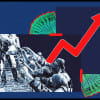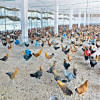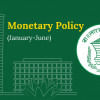Industrial output growth lowest since pandemic. Here's why

Bangladesh's factory output grew 6.66 percent in the current fiscal year, the slowest pace of expansion since the Covid-19 pandemic hit the country, as the stubbornly high inflation hurt domestic demand and the shipment of export-oriented goods slowed.
Import controls and increased prices of gas and electricity handed a further blow. As a result, the overall industrial production in 2023-24 was lower than 8.37 percent a year ago.
The Bangladesh Bureau of Statistics (BBS) released the provisional estimate of gross domestic product (GDP) on Monday.
Save for the pandemic that wreaked havoc on the economy, this year's estimate of growth of industrial output would be the lowest since 1996-97 when it stood at 6.39 percent.
In the first year of the pandemic, which was 2019-20, factory production grew 3.61 percent from a year ago.
Economists and entrepreneurs blame the lingering US dollar crisis, the rise in energy bills, and the higher consumer prices for the lower growth of industrial output and less than 6 percent GDP expansion for the second year in a row.
Powered by faster growth of the services sector, the economy clocked a 5.82 percent growth in the FY24. This is, however, below the average annual growth rate of 6.6 percent the country recorded in the decade preceding the Covid-19 pandemic.
The overall growth might be lower than the provisional figure when the BBS calculates the GDP based on the full year data. The state-run statistical agency has prepared the interim estimate based on the data available in the first seven months of FY24.
"The positive side is that the industrial sector is still growing at above 6 percent," said MA Razzaque, research director of the Policy Research Institute (PRI).
"The growth rate has fallen, and this is not surprising as the inflation rate is higher, which has raised the production cost."
The general index of industrial production (large-scale manufacturing) increased 4.41 percent year-on-year in July-February of FY24 compared to 7.79 percent in the same period of the previous year, according to a monthly publication of the Bangladesh Bank.
Razzaque said the government has unveiled an import control strategy that drove down the purchase of raw materials and capital machinery from international sources. "Therefore, it was expected that the industrial growth would decelerate."
BB data showed that imports slumped 15.42 percent to $45.6 billion in the nine months to March compared to a year earlier. The import of capital machinery, industrial raw materials and intermediate goods also declined.
For example, the import of capital machinery as reflected in the opening of letters of credit decreased 19 percent in July-February. A drop in capital machinery imports indicates that industrial expansion is shrinking.
"As we have had both higher inflation and import restrictions for several months and the foreign exchange reserves situation has not improved, the economy may slow down further," Razzaque said.
He said it is tough to curb higher inflation and boost the reserves simultaneously. "It is a fatal combination. It is tough for the policymakers to control both."
Md Fazlul Hoque, a former president of the Bangladesh Knitwear Manufacturers and Exporters Association, said the lower growth rate of industrial production was logical as factories were struggling for numerous factors.
"The local currency has weakened against the US dollar massively while the prices of gas and electricity have gone up. Other costs in the industrial sector also rose."
Hoque said since the overall inflation has stayed at an elevated level, people are buying less because their purchasing power has eroded.
Consumers prices have remained above 9 percent since March last year.
According to the business leader, export-oriented industries are going through a difficult time owing to consumption slowdown abroad and the crises at home. Therefore, export earnings have not been good.
Exports grew 3.93 percent in July-April of FY24, down from 5.38 percent in the same period a year ago, Export Promotion Bureau (EPB) data showed.
The shipment of most items declined in the first 10 months of the fiscal year while the sales of readymade garments, which account for about 85 percent of Bangladesh's overseas income, are slowing down.
"Due to the slower growth rate in the industrial sector, some small companies are becoming sick," Hoque said. "Under the circumstances, adequate jobs will not be created. Some may even lose jobs."
Hoque said the business situation has become more complex, so political will in real sense is necessary to improve the climate and give a much-needed fillip to job creation.
A former president of the Dhaka Chamber of Commerce and Industry thanked the BBS for acknowledging that the industrial sector is really under pressure.
He feared that the growth rate may be lower than the projection at the end of the year.
"The industrial growth rate dropped because both domestic market-oriented industries and export-oriented factories are facing challenges," said Anwar Ul Alam Chowdhury Parvez, president of the Bangladesh Chamber of Industries.
Because of the higher energy costs, the industrial sector has suffered a lot. Moreover, there was a shortage of gas supply. In recent months, the interest rate of loans surged.
"As a result, the production costs have climbed," he said.
The electricity tariffs were revised upwards three times in 2022-23, resulting in a compound increase of around 15.7 percent.
Likewise, the price of diesel rose 37 percent and furnace oil 41.4 percent. The price of gas for industries went up by 150 percent to 178 percent in FY23.
Loans may become costlier further after the central bank allowed the market to decide the lending rate on May 8. Currently, the interest rate of loans in the banking sector hovers around 14 percent, which was capped at 9 percent for more than three years to July last year.
PRI's Razzaque said the sluggish growth of industrial production will have implications for job creation. "At the same time, it may cause some companies to become financially sick."

 For all latest news, follow The Daily Star's Google News channel.
For all latest news, follow The Daily Star's Google News channel. 








Comments